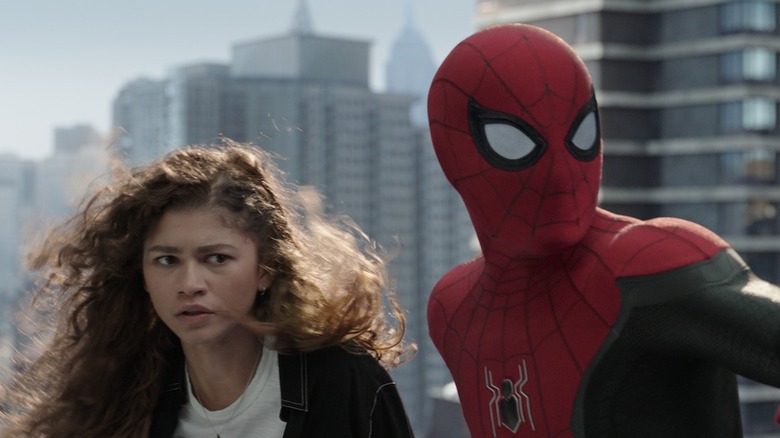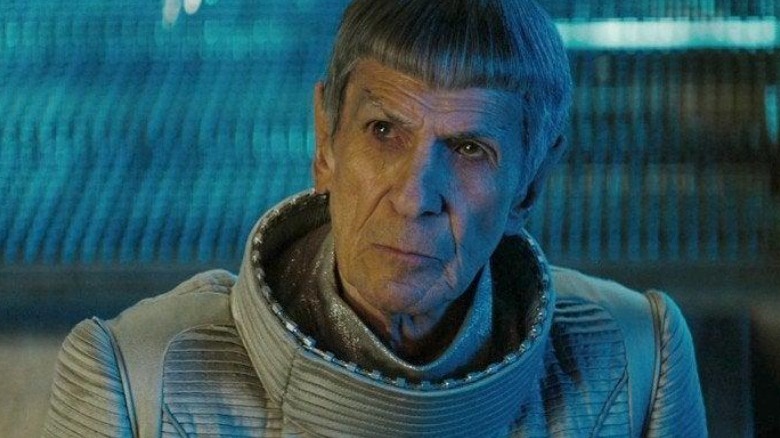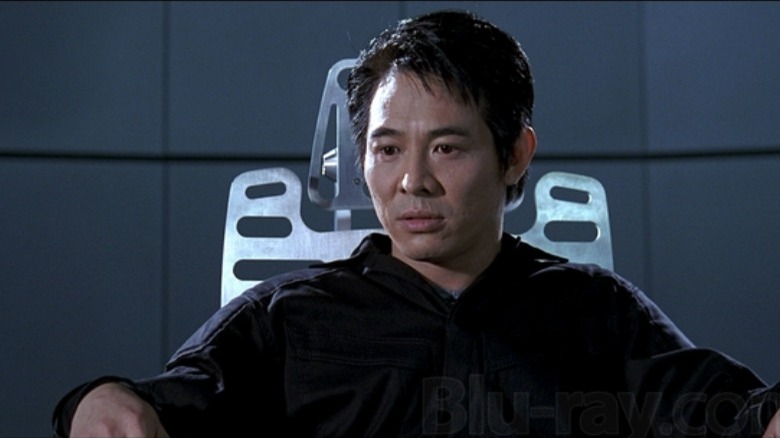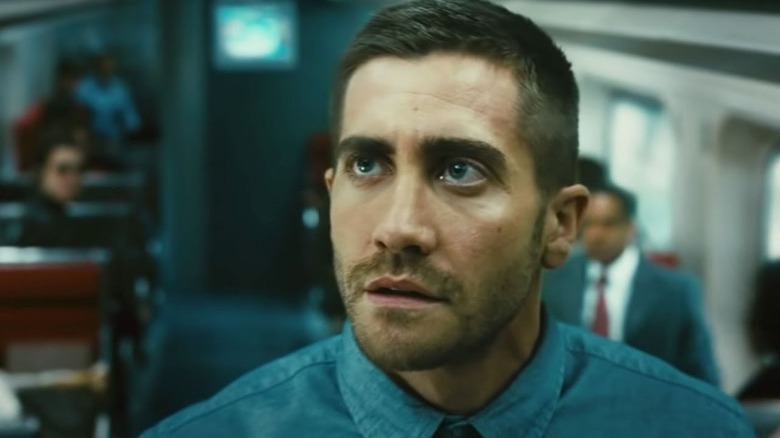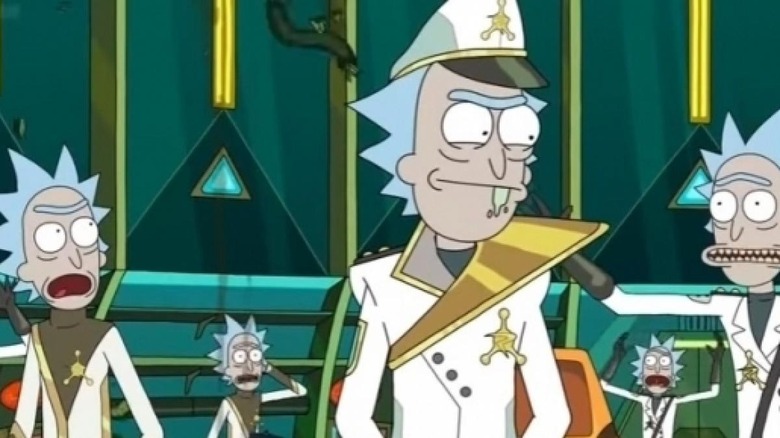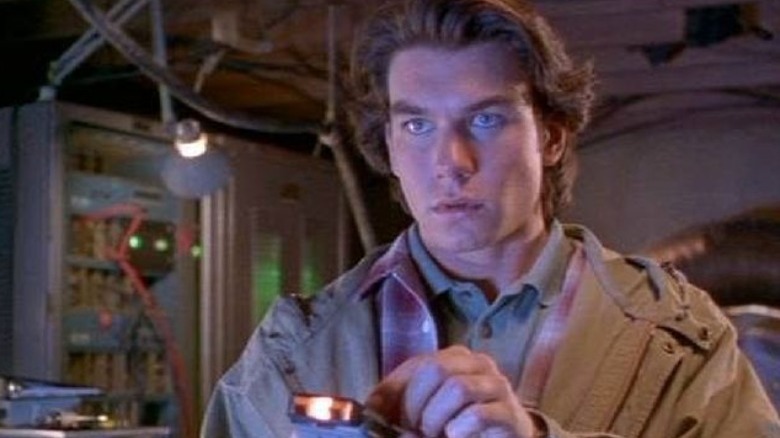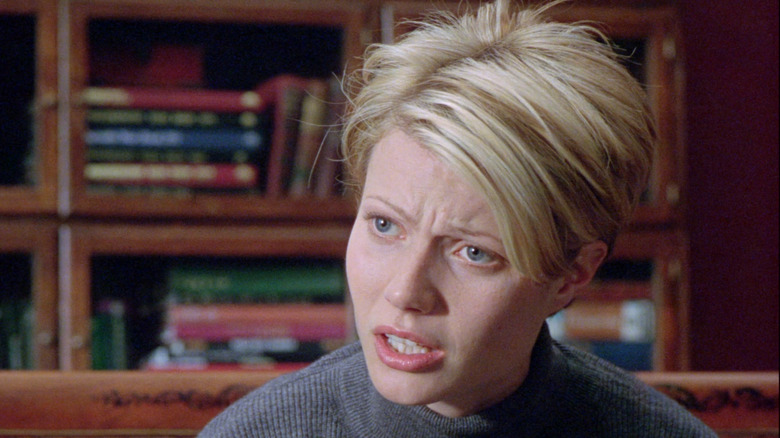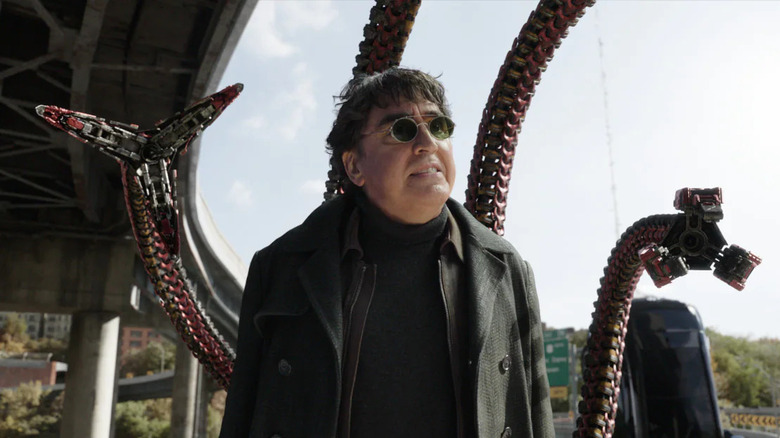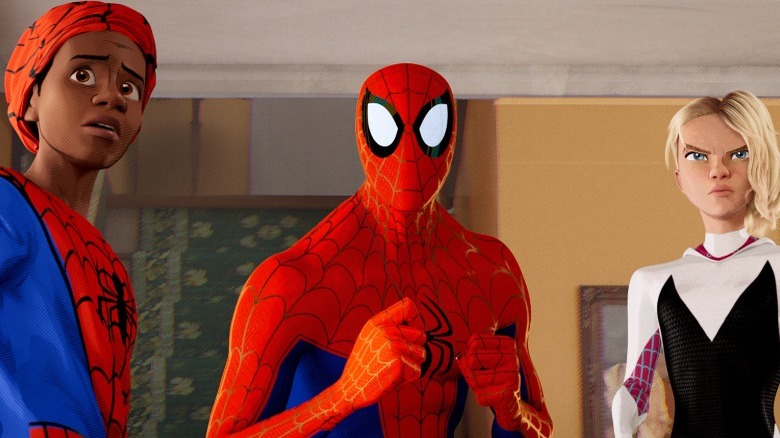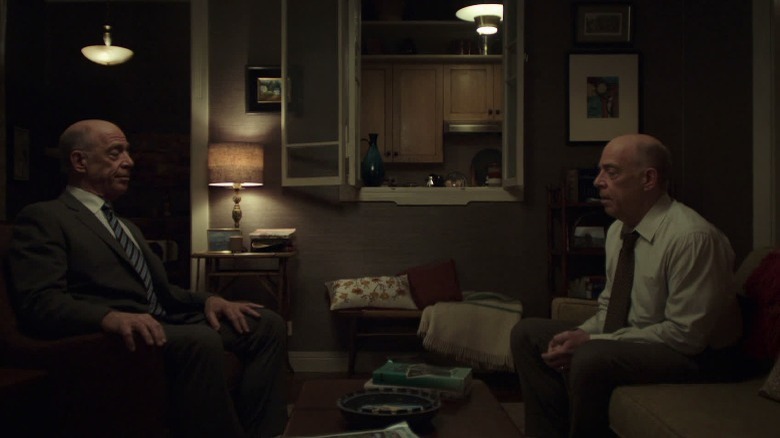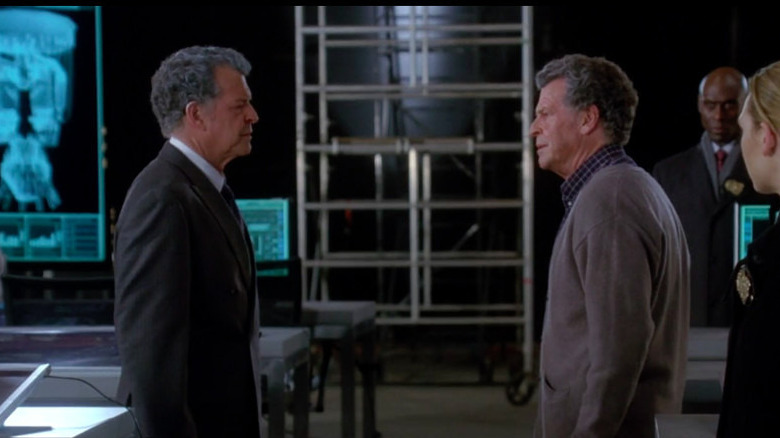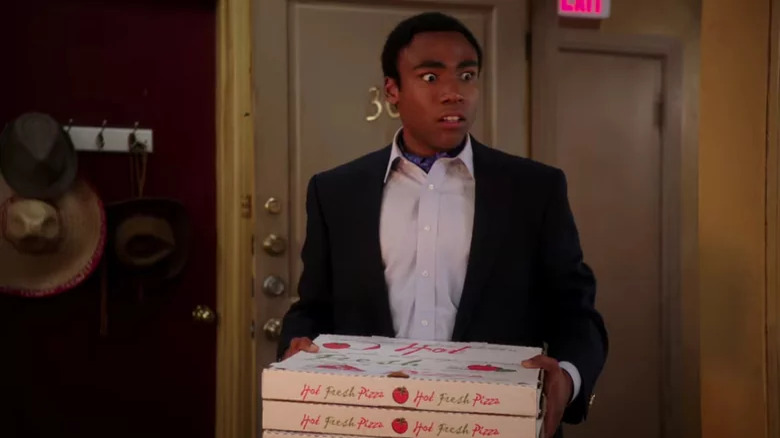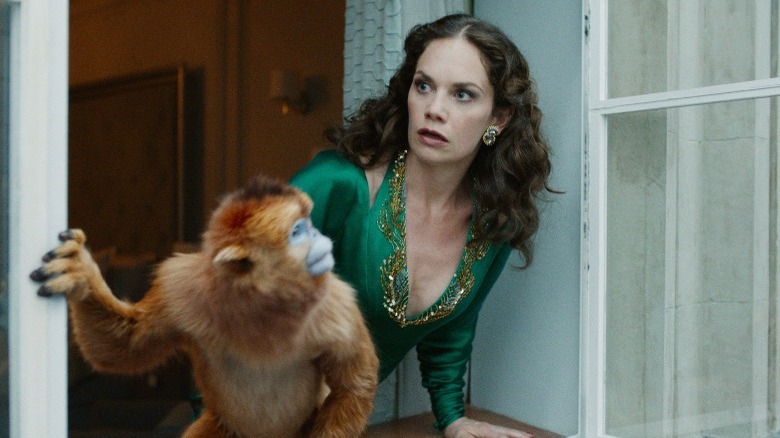The Best Movies And Shows About Multiverses
Is our reality the only one there is? Has everything in our lives been leading to this specific moment, to these mistakes and worries, these triumphs and adventures? Or could the sequence of events be just one out of an infinite number of possibilities? Whether or not you understand the science of infinite bubble universes and string theory, the idea of parallel universes that contain multiple versions of ourselves is a fascinating one, which science fiction has returned to time and time again.
If you're a Spider-Man fan, you're no stranger to this concept. After 2018's "Spider-Man: Into the Spider-Verse," followed by the resounding box office success of "Spider-Man: No Way Home," the concept of multiple universes (or a "multiverse," to save a little bit of time) has reached its widest audience yet. "No Way Home" manages to capitalize on the protracted, needlessly complicated tug-of-war for the rights to make Spider-Man movies between Sony and Marvel and tell a story that zaps characters from other cinematic universes into the MCU for maximum chaos.
The MCU itself was technically already a multiverse after the time-altering events of "Avengers: Endgame," and "Loki," and is betting big on them in the future. But most stories about multiverses, cinematic and televised, don't have the benefit of such well-known source material. Some of them invite cosmic wondering about the fabric of reality, others invite their characters to make introspective realizations as they encounter slightly different versions of themselves. These are the best movies and shows about multiverses.
Star Trek (2009)
Often deeply enmeshed with the theory of a fictional multiverse are the mechanics of time travel. Would traveling to the past create a new timeline that splinters off in a new direction? Would your presence in the past alone cause that to happen, or would it only be bad news if you altered certain key events? In 2009, director J.J. Abrams used time travel as a convenient way to reboot the "Star Trek" franchise while still drawing elements from the original continuity of the show and feature films of the 70s and 80s.
Unlike the much more vague time travel mechanism of stories like "Back to the Future," which has Marty McFly scrambling to avoid paradoxes like causing his own parents not to meet, when Spock is chased through a wormhole into the past in "Star Trek," he and the Romulan ship pursuing him are stranded decades in the past, and create a new universe by altering events. The biggest consequence is really the death of James T. Kirk's father at the beginning of the film, which is why he grows up into a rebellious hothead played by Chris Pine instead of the more reserved hothead made famous by William Shatner.
The One
2001's "The One" has perhaps the most unique premise for a workmanlike action movie. It's basically a combination of multiverses and "The Highlander:" a rogue agent of the MultiVerse Authority (sort of a gun-toting, interdimensional TSA) is traveling to every universe to kill his other selves, absorb their life force, and become a god-like being called "The One." There are precisely 124 universes, connected by wormholes that appear at random, very quickly it's down to just bad guy Gabriel Yulaw and good guy Gabe Law, both played by legendary action-star Jet Li.
It raises a lot of interesting questions about the way the "life force" in question operates between universes, and the ways that reality might be tied to human consciousness in the world of "The One," but the movie is more interesting in having Jet Li fight himself a whole lot via CGI split-screens and stunt doubles dressed in the same clothes. It's a ton of fun, and the cast is rounded out by great actors like Carla Gugino, Delroy Lindo, and an early-career Jason Statham.
Source Code
It's technically a spoiler for a decade-old film, but "Source Code" is a secret multiverse movie that starts as a "Groundhog Day" time loop scenario. The "source code machine" that gives the movie its title is allegedly an experimental machine that allows a soldier played by Jake Gyllenhaal to have his consciousness projected, over and over, into a "simulation" of the past reconstructed from the memories of the dead. His mission is to learn, in just 8 minutes, what caused the train bombing that killed them.
"Source Code" uses the time loop to effective, disorienting effect as it's initially not clear to Gyllenhaal's character what's happening to him, and why he's been chosen for it. Eventually both his reality and the nature of the "source code" turn out to be entirely different than he assumed. It's a propulsive action movie that contains a subtle, deeply perplexing idea: what if human consciousness and the nature of time and reality are more interconnected than they seem? What if we don't observe reality but create it as we perceive it?
Rick and Morty
The problem with multiverses is that they can very soon get out of hand. Especially in comic books and other long-running sci fi franchises, the number of alternate versions of characters can be impossible to keep track of, and lead to crossover events to deal with the insanity like "Crisis on Infinite Earths," a massive effort from Marv Wolfman and the legendary George Perez to simplify the DC Comics timeline in 1985. By contrast, Adult Swim's hit cartoon "Rick and Morty" starts with the chaos of multiple universes and makes no attempts to keep track or clarify anything.
Mad scientist Rick Sanchez is a genius that can invent seemingly anything, and long ago came up with a portal gun that gives him access to all possible worlds. This has led to the main characters of the show switching to new universes permanently when his adventures leave their original ones irreparably changed, and an infinite number of each main character for whatever story creators Dan Harmon and Justin Roiland want to tell. Rick has an entire theme park to drop off his clumsy son-in-law Jerry with several dozen other Jerrys, and there's even a "Citadel of Ricks" where there are so many Ricks and Mortys there's an entire society that's explored in an elaborate parody of "The Wire."
Sliders
Many older Millennials first fell in love with the multiverse concept with the 90s cult-hit Fox show "Sliders." Jerry O'Connell plays a grad student experimenting with wormholes that develops a device that allows him to "slide" to alternate universes by opening a portal, and then slide home after a pre-set amount of time. But on his first trip, he and his companions are forced to slide off-schedule to avoid a tornado and find themselves unable to get home. The timer sends them endlessly to new universes for random intervals that are usually long enough to have some sort of dramatic misadventure.
It's a carte blanche premise for the writers, who use the multiverse concept to depict all manner of alternate histories where the U.S. never revolted against Britain, or was taken over by Russia. There's an Old West world, a world where the "Free Love" movement of the 60s never ended, worlds where everyone has psychic powers or aliens have invaded. It's a brilliant idea and a fun show, at least for the first two seasons. The last three years of the show, two of which hopped over to the Sci-Fi network, were still campy fun but saw a mass exodus of the cast and stale writing. By the time it ended on an abrupt cliffhanger, all but one of the original cast had left. "Sliders" was earnest, creative, and very unique as a big-network genre show in the mid-90s, and still holds a place in fans' hearts.
Sliding Doors
The idea that makes the multiverse resonate so strongly with us, stuck here in the same timeline we were born in, is possibility. If we exist alongside all versions of events, we create new universes with every decision we make, with every chance meeting and random mishap. "Sliding Doors," a romantic drama starring a young Gwyneth Paltrow, doesn't contain any sc fi elements or reference parallel universe theory explicitly, but takes place in two timelines at once: one where the main character catches a train, and the other where she doesn't.
"Sliding Doors" has a great dual performance from Paltrow, as the trickle effect of missing the train causes her life to unfold very differently in one timeline– it helps that she promptly gets a drastic new haircut in one of them to make them easier to tell apart. Compared to most of the films on this list, it's a subtle, quiet mediation on the way small events can shape who we are in huge ways.
Spider-Man: No Way Home
This list would be incomplete without acknowledging the masses currently enjoying the multiverse effect in theaters via "Spider-Man: No Way Home." As revealed to fans' frenzied delight in the trailer, a spell gone awry from Dr. Strange causes villains from other universes to get drawn into the MCU, and Tom Holland's Spider-Man has to fight an array of villains that are as surprised as to be there as everyone else. Two decades of Spider-Man movies all serve as fodder for "No Way Home" to create unique moments of humor, pathos and meaning from in one of the MCU's most unique entries to date.
While the mechanics of the "magic spell" method are rather vague and unsatisfying in the technical sense, "No Way Home" more than makes up for it with its spontaneous applause-inducing character reveals and epic action scenes. It also takes Holland's version of Peter Parker through a new version of the same emotionally resonant Spider-themes of responsibility and loss, well into his MCU tenure.
Spider-Man: Into the Spider-Verse
Any praise for "Spider-Man: No Way Home" goes double for the movie that arguably paved the way for its success back in 2018. "Spider-Man: Into the Spider-Verse" is regarded by many as not just the best Spider-Man movie, but the best comic book movie of all time. As an animated movie, it has a natural advantage in having no limitations in what it can do to create a kinetic, dynamic visual language that feels like the visual equivalent of reading a comic book. But it's also a story told confidently, full of emotionally resonant characters and fast-paced, hilarious dialogue.
"Into the Spider-Verse" also establishes its villain, Kingpin, as one of the most compelling and well-realized adversaries in any Spider-Man movie. Seeking to find alternate versions of his late wife and son, Kingpin builds a massive machine under New York City that calls Spider-people from several strange dimensions into the universe of Miles Morales, who's just been bit by a radioactive spider himself. "Into the Spider-Verse" is even more complicated than "No Way Home," but manages to make even more sense by the end of it.
Counterpart
The series "Counterpart" uses the idea of a bridge being created between two identical universes as a jumping-off point for a two-season riff on the Cold War. Just in case you don't get the obvious parallels, it's set in Berlin. The real highlight of the show is J.K. Simmons, who stars as a mild-mannered, low-level number puncher in one universe that's shocked to discover his alternate self is a confident, deadly government agent.
There are 30 years of backstory, a mysterious flu illness that may have been released on one universe by the other, and plenty of plot to fill 20 episodes. Throughout it all, J.K. Simmons is both the nebbish drone weighed down by life, and an unleashed terrifying force. At various points he has to play both versions of his character masquerading as the other one, layering two new performances on top of the original two. It's a masterpiece of multiverse acting.
Fringe
"Fringe" is a show that began as a mildly forgettable clone of "The X-Files," where a different strange mystery was solved each week, that slowly evolved into one of the most ambitious shows on network television. Bit by bit, the show embraced its serialized, deeper mythology and revealed itself to be an epic story about parallel worlds, alternate timelines, and eventually even a futuristic dystopia. Seasons 2 and 3 deal directly with the multiverse as "Fringe division," a special detachment of FBI agents and scientists that study strange phenomenon, go head to head with shadow versions of themselves from an alternate dimension.
"Fringe" uses the parallel world to get dual performances of wonderful subtlety from nearly all of its main cast, and to throw a monkey wrench into all of the established relationships. The bonds of the central father-son relationship are thrown into question, and the long-simmering "will they or won't they?" couple gets broken up by an interdimensional impostor. By the time Season 4 creates an alternate timeline in addition to an alternate dimension, "Fringe" has more than carved out a unique place in the annals of multiverse storytelling history.
Community- "Remedial Chaos Theory"
Even though it's just a single episode, the all-time classic "Community" episode "Remedial Chaos Theory" uses a simple die to tell one of the most hilarious and memorable multiverse stories. To this day, several times a day, people observe some dismaying or dystopian thing in the news on social media and comment that we truly live in "the darkest timeline" — a reference to the episode's tag scene.
The premise is simple: the study group rolls a die to see who will go downstairs to wait for a pizza to be delivered. With each iteration, as a different character is briefly gone, the other ones interact slightly differently in ways that inform our understanding of the entire group dynamic. The repetitive nature allows several jokes to pay off multiple times in different ways, and at least one timeline devolves into pure chaos. Even for "Community," which had multiple complicated and brilliant episodes, "Remedial Chaos Theory" is widely regarded as the show's best.
His Dark Materials
Most stories about multiple universes either don't deal with the larger implications meaningfully, or do so in purely scientific terms. "His Dark Materials," HBO's adaptation of Phillip Pullman's beloved trilogy of books, explores the implications of a multiverse in the theological sense. The story at first is about an alternate world where humans have soul companions called "daemons" that live outside their bodies as animals, but soon a mysterious compass and knife unlock the path to other worlds. A shadowy organization that bears more than a few similarities to our universe's Catholic Church takes measures to put a stop to research into other worlds, since a multiverse sort of contradicts the scriptures.
Eventually, and especially in the third and final season coming out this year, "His Dark Materials" takes on the afterlife and the very idea of god, and fuses the scientific and the magical into one comprehensive view of the universe. It's an all-encompassing story that is deeply human and touching at its center.
